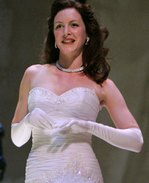SITE GUIDE
SEARCH
REVIEWS
REVIEW ARCHIVES
ADVERTISING AT CURTAINUP
FEATURES
NEWS
Etcetera and
Short Term Listings
LISTINGS
Broadway
Off-Broadway
NYC Restaurants
BOOKS and CDs
OTHER PLACES
Berkshires
London
California
New Jersey
DC
Philadelphia
Elsewhere
QUOTES
TKTS
PLAYWRIGHTS' ALBUMS
LETTERS TO EDITOR
FILM
LINKS
MISCELLANEOUS
Free Updates
Masthead
Writing for Us
A CurtainUp  London Review
London Review
 London Review
London ReviewTroilus and Cressida
|
All the argument is a whore and a cuckold; a good quarrel to draw emulous factions and bleed to death upon.— Thersites
|

Marianne Oldham as Helen
(Photo: Keith Pattison) |
The central theme to this production is the deconstruction of heroism. The Homeric narrative is demythologised and exposed as pointless bloodshed and misconceived idealism. Not only is the brutality of this play left unameliorated, it is in fact sharpened into less forgiving, harsher strains. Each character has been thoroughly re-interpreted with this thematic crux in mind. Therefore, Troilus (Alex Waldmann) is no romantic hero, but rather a pontificator of useless, empty bombast. As Cressida (Lucy Briggs-Owen) characterises all lovers, so Troilus is played as having "the voice of lions and the act of hares". Cressida's soliloquies where she confides her love or contrition are excised. Instead of undermining the sympathy of her character, this makes it clear she is absolutely helpless under the exclusively masculine regime and her true feelings are irrelevant in her powerless vulnerability.
Again, Hector's (David Caves) sense of fair play is shown to be blind weakness rather than virtue, as he spares the lives of his enemies and thus imperils his family and whole city. There is no attempt to accord Achilles (Paul Brennen) any heroic strength or skill, and his glories are achieved by stealthy, dirty tactics. The great king of Troy, Priam (also played by Paul Brennen) is so fragile in his elderly state, that he is carried onstage and only speaks horizontally from his deathbed. Ulysses (Ryan Kiggell) is not played as the usual far-sighted pragmatist but is a lisping, awkward pen-pusher among his more macho allies. He wins his arguments not with expert persuasion but with blackmail-able photographs. Instead of being the bright hope for Troy, the herald prince Aeneas (Tom McClane) thrives too much on his speechifying and leads the deeply unpleasant testosterone-fuelled jeering which constitutes the Greeks and Trojans' means of communication.
Helen (Marianne Oldham) is given greater prominence, a reminder of her causal role in the bloodshed. In a white ball-gown she tantalisingly flirts with the lined-up soldiers or poses with Paris (Oliver Coleman) in celebrity photo shoots. She is the figurehead of a culture where the warriors parade in from the battlefield to the sound of applause.
Thersites (Richard Cant) is the only antidote to this implacably lethal spin; the only seer of the squalid truth in this world of corruption and deceptive, pernicious ideals. Cross-dressed with a Lily Savage accent, his main role in the camp is to clean the pedestals which the warriors stand upon. When he performs the masque for the benefit of the visiting Trojan princes, he is dressed as Helen and pretends to kill the warriors around him with a simple gesture. His onstage audience laugh uproariously, cheer and happily mime their deaths repeatedly, but it is a grimly prescient sequence.
Set on a traverse stage with long strips of canvas, one side ending in straight pillars and on the other, angled and unfurled, they represent the towers of Troy and the tents of the Greek camp respectively. Nick Ormerod's design is nicely interwoven with the direction and allows uninterrupted lines of movement across stage.
Compelling but bleakly unsettling, this production gives no quarter for hopefulness or softer sentiments. Cheek by Jowl's interpretation is incredibly thorough and coherent, providing a new insightful perspective on Shakespeare's text and focussing on the skewed, doomed or destructive loves and the deadly rhetoric and idealism which are central to this play.
|
Troilus and Cressida
Written by William Shakespeare Directed by Declan Donnellan With: Anthony Mark-Barrow, Paul Brennen, Lucy Briggs-Owen, Richard Cant, David Caves, Oliver Coleman, David Collings, Gabriel Fleary, Mark Holgate, Damian Kearney, Ryan Kiggell, Tom McClane, Marianne Oldham, David Ononokpono, Laurence Spellman, Alex Waldmann Designer: Nick Ormerod Associate Director and Movement: Jane Gibson Lighting Designer: Judith Greenwood Music: Catherine Jayes Sound Designer: Gregory Clarke Running time: 3 hours 15 minutes with one interval Box Office: 0845 120 7511 Booking at the Barbican to 14th June 2008 and then on tour 2nd July — 6th July Teatre Lliure, Grec Festival, Barcelona, Spain 9th July — 12th July Almagro Festival, Spain 17th July — 26th July Matadero, Teatro Espanol, Spain Reviewed by Charlotte Loveridge based on 4th June 2008 performance at the Barbican Theatre, Silk Street, London EC2Y 8DS (Tube: Barbican) |
|
REVIEW FEEDBACK Highlight one of the responses below and click "copy" or"CTRL+C"
Paste the highlighted text into the subject line (CTRL+ V): Feel free to add detailed comments in the body of the email and state if you'd like your comments published in our letters section. |
|
London Theatre Tickets Lion King Tickets Billy Elliot Tickets Mighty Boosh Tickets Mamma Mia Tickets We Will Rock You Tickets Theatre Tickets |




